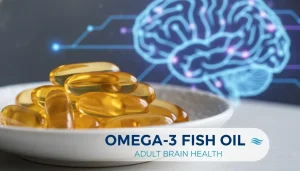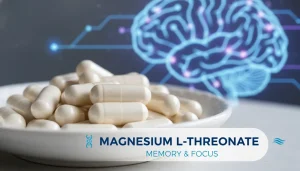I often hear adults say, “I can’t think as clearly as I used to,” or “I forget things more often than before.” That’s why I focus on the best brain supplements for adults — the nutrients and natural compounds that support memory, focus, and overall mental clarity.
Over the years, I’ve learned that a combination of nutrition, lifestyle, and certain natural supplements can make a noticeable difference in focus, memory, and mood. Today, I want to share the brain nutrients I use and recommend in my practice to keep cognitive performance sharp.
Here’s a quick overview of what you’ll learn in this post:
- How inflammation affects your mental sharpness
- Nutrients and supplements that enhance memory and attention
- Evidence-based options that I personally recommend
- Tips for safe and effective supplementation
- Lifestyle habits that amplify the effects of supplements
Top Brain Supplements for Adults That Actually Work
Many adults think forgetfulness is just a part of aging. However, in my experience, chronic neuroinflammation often plays a bigger role than most people realize.
Inflammation in the brain can disrupt neuron communication, leading to “mental fog,” slower processing, and even irritability. It’s like trying to hold a conversation on a phone line with too much static — the messages get through, but not clearly.
Specialized pro-resolving mediators (SPMs) are compounds that help the brain resolve inflammation naturally. Unlike traditional anti-inflammatory drugs, these nutrients don’t suppress the immune system — they guide it back into balance.
In my practice, I’ve seen patients respond positively to SPM supplements, reporting clearer thinking, steadier mood, and improved mental stamina. These compounds have become a foundational part of my approach for adults concerned about long-term brain health.
Omega-3 Fatty Acids: Essential for Adult Brain Health

More than half of the brain is made up of fat, and omega-3 fatty acids are critical for keeping those cells healthy. The two main types, DHA and EPA, support neuron structure, neurotransmitter function, and reduce inflammation.
Research shows that people who regularly consume fatty fish experience slower cognitive decline and lower risk of Alzheimer’s disease. For adults who don’t eat fish often, supplementing with fish oil or algae-based omega-3s can provide the same protective benefits.
I also like to remind patients that omega-3s can help stabilize mood. Some studies even suggest that these supplements improve mild depressive symptoms comparably to prescription medications — without unwanted side effects.
Magnesium and Other Best Brain Supplements for Adults

Magnesium is one of those nutrients I always stress to adults who are struggling with focus and memory. It’s critical for neuron communication, energy production, and brain plasticity — the ability to form new neural connections.
Most magnesium supplements, however, don’t cross the blood-brain barrier effectively. That’s why I prefer magnesium L-threonate, which can increase brain magnesium levels by around 15% and significantly improve memory and learning in adults of all ages.
In my experience, combining magnesium with omega-3 fatty acids gives a noticeable boost in mental clarity. Patients often comment that tasks requiring focus feel less taxing, and their ability to retain information improves within weeks.
PRMs — New Science in Resolving Brain Inflammation
While omega-3s are valuable, they sometimes aren’t enough to fully resolve stubborn inflammation. That’s where PRM (pro-resolving mediator) supplements come in.
Recent research shows that adults with chronic neuroinflammation, including early Alzheimer’s, have low levels of PRMs but high receptor availability in the brain. This means supplementation can reach its target effectively, reducing inflammation without suppressing immunity.
I include PRMs in my recommendations for patients with brain fog or early memory issues. They’re safe, non-toxic, and may enhance the effects of other brain-supporting nutrients.
Herbal Support for Mental Clarity
Several natural herbs complement the nutrients above, helping with focus, memory, and resilience against stress:
Bacopa Monnieri
Bacopa is an Ayurvedic herb that supports memory and attention. It works gradually, usually taking 4–6 weeks to show benefits. In my practice, I often combine it with omega-3s for better long-term results.
Lion’s Mane Mushroom
Lion’s Mane promotes nerve growth factor (NGF), which supports neuron repair and regeneration. I’ve seen improved focus and memory in adults using this supplement consistently over time.
Rhodiola Rosea
Stress can be one of the main causes of mental fatigue. Rhodiola acts as an adaptogen, helping the brain handle stress more efficiently. I recommend taking it in the morning to enhance energy and mental endurance without jitteriness.
Curcumin
Curcumin, from turmeric, has antioxidant and anti-inflammatory effects. Pairing it with black pepper (piperine) enhances absorption. I often suggest combining curcumin with omega-3s for maximum anti-inflammatory benefits.
How I Recommend Adults Choose Supplements
Selecting the right supplements can be confusing. Here’s my approach:
- Look for third-party tested products for purity and dosage.
- Avoid proprietary blends that don’t specify amounts.
- Stick to forms known for bioavailability (magnesium L-threonate, standardized Bacopa).
- Start with one or two supplements and increase gradually.
Consistency matters more than quantity. I see better results when patients use supplements regularly and combine them with proper diet, hydration, and sleep.
Lifestyle Habits That Amplify Supplement Effects
Supplements are just one piece of the puzzle. I always remind adults that:
- Balanced diet, rich in leafy greens, fatty fish, and antioxidants, is essential.
- Exercise improves blood flow and neurogenesis. Even brisk walks help.
- Adequate sleep allows the brain to clear toxins and consolidate memories.
- Stress management is critical — mindfulness or meditation can enhance cognitive benefits.
- Mental challenges like learning new skills or puzzles keep the brain adaptable.
Potential Side Effects and Safety Notes
While most natural brain supplements are generally well tolerated, it’s important to understand that individual reactions can vary. I always encourage patients to start slowly and pay attention to how their body responds.
-
Bacopa Monnieri: Some people may experience mild stomach discomfort, nausea, or increased bowel movements, especially when first starting. Taking it with food usually minimizes these effects.
-
Rhodiola Rosea: This adaptogen can occasionally cause slight stimulation, mild dizziness, or jitteriness, particularly if taken late in the day. I recommend starting with a low dose in the morning to gauge tolerance.
-
Magnesium L-Threonate: Generally safe, though very high doses might lead to loose stools in some individuals. It’s best to follow the recommended dosage and spread it across the day.
-
Omega-3 Fatty Acids: High doses may thin the blood slightly, so people on blood-thinning medications should consult their doctor before use. Minor fishy aftertaste or reflux can occur, which can often be mitigated by taking the supplement with meals.
-
PRMs (Pro-Resolving Mediators): These are usually well tolerated, with no known major side effects, because they support the body’s natural inflammation-resolution processes rather than suppressing immunity.
Important precautions:
-
Pregnant or nursing individuals should always consult a healthcare professional before starting any supplement regimen.
-
People taking medications — including anticoagulants, antidepressants, or blood pressure drugs — should check for potential interactions.
-
Begin with smaller doses, then gradually increase to the recommended amount. This allows your body to adjust comfortably and minimizes the risk of digestive or mild neurological effects.
-
Pay attention to your body and discontinue use if any unusual symptoms arise.
Finally, supplements should complement, not replace, a healthy lifestyle. Proper nutrition, exercise, hydration, and sleep are critical to maximize cognitive benefits. Think of supplements as supportive tools — they enhance brain function when combined with consistent, healthy habits.
My Daily Routine for Supporting Adult Brain Health
I’ve found that consistency is the key to keeping my mind sharp and resilient, so I structure my day with habits that support both brain function and overall well-being. Every morning, I start with magnesium L-threonate and omega-3 supplements, usually with breakfast. I’ve noticed that taking them alongside food improves absorption, and it also gives me a small ritual to mentally prepare for the day.
Breakfast itself is nutrient-rich — typically including omega-3-rich eggs, a handful of nuts, or leafy greens, paired with a high-quality protein source. I pay attention to hydration too; even mild dehydration can subtly slow cognitive performance. I usually drink a full glass of water before breakfast and keep a water bottle nearby throughout the morning.
After breakfast, I dedicate at least 15–20 minutes to a mental warm-up. This could be a crossword, Sudoku, or reviewing a few notes on a topic I’m learning. I’ve found that starting the day by actively engaging my brain makes the rest of the day’s tasks easier and more productive.
Mid-morning, I often take a short walk — just 10–15 minutes outside. The movement increases blood flow to the brain and helps consolidate the supplements’ benefits. Sunshine also boosts vitamin D, which further supports cognitive function and mood.
Lunch is balanced with high-quality protein, complex carbohydrates, and vegetables, again aiming for a mix of nutrients that fuel the brain and maintain stable energy levels. I avoid processed sugars during the day, as spikes and crashes in blood glucose can leave you mentally foggy.
Throughout the afternoon, I take short breaks every 60–90 minutes to stand, stretch, or practice deep breathing. These small pauses help reduce mental fatigue and stress, allowing the brain to remain alert for longer periods.
Dinner is lighter and focused on anti-inflammatory foods like salmon, vegetables, and whole grains. In the evening, I avoid heavy screen use before bed and aim for 7–8 hours of quality sleep, as restorative sleep is when the brain clears waste, consolidates memory, and strengthens learning.
Occasionally, I incorporate adaptogenic herbs like Rhodiola or Lion’s Mane into my routine, depending on stress levels or cognitive demands. These supplements provide an extra layer of support for focus, resilience, and memory.
Even small lifestyle adjustments — consistent meals, hydration, movement, mental exercises, and quality sleep — paired with the right supplements, make a noticeable difference in clarity, mood, and mental energy. Over time, these habits compound, and I genuinely feel that my brain operates at a higher, more stable level throughout the day.
Final Thoughts
I believe every adult can support their brain health proactively. Supplements like omega-3s, magnesium, PRMs, and targeted herbs provide a foundation, but consistency and lifestyle matter most.
Think of supplements as allies — not magic pills. With the right approach, your mental clarity, memory, and focus can thrive well into the later years.
FAQ
1. What are the best supplements for adult brain health?
I recommend a combination of omega-3 fatty acids, magnesium L-threonate, PRMs, and select herbs like Bacopa and Lion’s Mane for memory, focus, and mental clarity.
2. How long does it take to see results?
Most people notice subtle improvements within 4–6 weeks, with more significant changes after consistent use over 2–3 months. Herbs like Bacopa and Lion’s Mane may take longer.
3. Are brain supplements safe with medications?
Generally yes, but it’s always wise to consult your doctor if you’re on prescription drugs or managing chronic conditions. Some supplements may interact with blood thinners or certain antidepressants.
4. Can lifestyle habits improve supplement effectiveness?
Absolutely. Balanced diet, quality sleep, hydration, exercise, and mental stimulation all enhance the benefits of brain supplements. Think of supplements as support — not a replacement — for a healthy lifestyle.
5. Can I take multiple brain supplements together?
Yes, many supplements can be combined safely, but I advise starting with one or two key nutrients first, then gradually adding others to monitor effects and tolerance.
